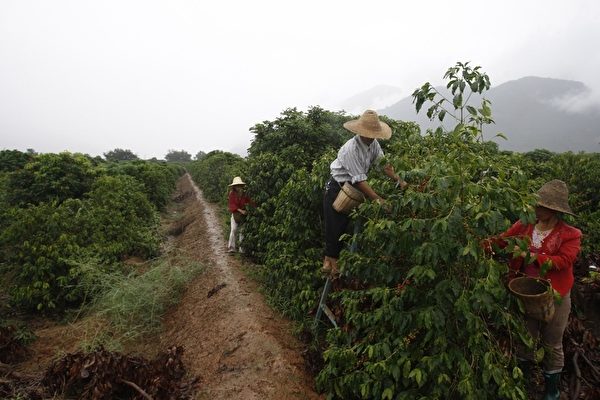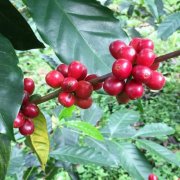The price of caffeine tea in Yunnan, China collapses, "Black Gold" soars, Pu'er Town changes to Coffee

For professional baristas, please follow the coffee workshop (Wechat official account cafe_style)
Pu'er Town, a city bordering Yunnan and Myanmar, has been growing Pu'er tea in this continuous hilly area for the past 2000 years.
Pu'er tea is famous for its simple flavor. Tea lovers say that the taste of Pu'er tea becomes more mellow with the increase of tea age. However, its value lies in the health benefits-Pu'er tea can lower cholesterol and high blood pressure, reduce fat and purify toxins from the liver.
These benefits led to frenzied auction prices of Pu'er tea in previous years, MSNBC News reported. Some reports in 2007 mentioned that some old Pu'er teas sold for as much as $10000 for 10 grams (.35oz).
Just a year later, the bubble burst quickly. The Pu'er tea market collapsed in a sales frenzy after a surge in prices deliberately manipulated by a group of unscrupulous wholesalers. As a result, many tea farmers have piled up worthless tea, but many have spread their risks to a burgeoning crop, coffee.
Nestle goes to Yunnan
In 1988, Yunnan produced only 1500 tons of coffee beans. This year, however, the province is expected to produce 5000 tons, and production is expected to double in the next five years. Coffee is now the province's third largest export, after tobacco and flowers.
Wang Middle School is a strong old farmer who is 72 years old this year. He made a profit of about $18000 from his coffee factory last year. Compared with the average annual income of about $900 for Chinese farmers, Wang's income is considerable.
He recalled that in 1992, Chinese and foreign experts gave him advice on growing coffee, some of them from the Swiss food giant Nestl é.
"this is a mountainous area with a good climate and a very suitable environment for growing coffee," said Smet, manager of Nestle's agricultural services department in Pu'er. " As early as 1988, Nestl é decided to support the cultivation of small coffee beans in Yunnan and has been working closely with local officials.
More than 80% of farmers are grown on a small scale, and Nestl é provides free training and technical assistance to these farmers, including everything from planting, processing to marketing.
"We buy coffee beans directly from farmers, not through middlemen," Smett said. In this way, Nestle can better monitor the quality of coffee beans. "
The local tasting center set up by Nestl é is responsible for testing the quality of coffee. The test method is "blind product" (the product appears in the same form, and testers do not see information such as packaging, in order to avoid preconceptions and ensure fairness as much as possible. If the coffee beans provided by farmers are lower than Nestl é's standards, delivery will be refused. But Dismet says they will remind farmers how to make improvements.
The lure of "black gold"
Understanding and tracking coffee prices is another skill Nestl é offers to farmers. In response to this, Smett said half-jokingly: "our farmers here have become speculators."
Every Monday and Thursday, Nestl é announces the price of coffee to all farmers via text messages. "We will also receive 150 to 200 calls from farmers to inquire about prices," Smett said. According to these prices, farmers are free to decide when to sell. "
Wang Lao's daughter and her friends know how to track the price of coffee on the Internet. "when the price goes up, we will know immediately," he said. "
Nowadays, coffee is sometimes called "black gold" and is the second most widely traded commodity after oil. In the past year, the bulk price of coffee has risen by nearly 92%.
An official of the Ministry of Agriculture surnamed Li retired 10 years ago and began training farmers in Yunnan to grow coffee. But he said: "We do not encourage tea farmers to stop growing tea and then switch completely to growing coffee."
In fact, farmers grow other cash crops besides coffee. For example, Wang Lao also planted mango trees, which helped shade the sun and protect his coffee fields.
Chen Bing, a 40-year-old farmer, gave up growing corn and rice, mainly because they needed a lot of irrigation. In addition to coffee, his farm also grows tea trees. "when the climate is dry, we rely on coffee, but when the climate is humid, we rely on tea," he said. "
Starbucks' seed-to-cup strategy
At the end of last year, Starbucks announced plans to set up a base farm in cooperation with local officials in Yunnan. The farm will include a technical support center and processing facilities. Wang Jinlong, head of Starbucks Greater China, said: "the purpose of the farm is to demonstrate how to improve the lives of coffee farmers by increasing production while taking into account environmental protection and social responsibility."
Since entering the Chinese market in 1999, Starbucks has opened nearly 450 stores in China and plans to triple it by 2015. In 2009, Starbucks began to introduce coffee beans grown in Yunnan to customers and called them "clouds of the south".
The Yunnan Coffee Farm project marks the beginning of Starbucks to grow its own coffee instead of relying entirely on purchases. "this is our seed-to-cup overall supply chain strategy, and this idea will make China Starbucks' second home market," Jinlong said. "
But in Pu'er town, an interesting phenomenon is that although farmers grow coffee, they do not form their own habit of drinking coffee. Most people are still used to drinking tea.
Important Notice :
前街咖啡 FrontStreet Coffee has moved to new addredd:
FrontStreet Coffee Address: 315,Donghua East Road,GuangZhou
Tel:020 38364473
- Prev

Foreign media report: China has become a big coffee producer in Asia. Yunnan Coffee in China will meet a great opportunity.
Professional baristas follow Coffee Workshop (Wechat official account cafe_style) China is changing from a traditional tea grower to a coffee producer in Asia, growing high-quality small fruit coffee (Arabica grown coffee) and attracting international coffee groups and commodity traders to set up a foothold in Yunnan Province to facilitate the export of coffee beans, the Financial Daily reported.
- Next

Differences in flavor between Sri Lankan Ceylon, Darjeeling and Yunnan Hongying Hongzhengshan black tea
For the exchange of professional baristas, please follow the coffee workshop (Wechat official account cafe_style) Sri Lanka. Black tea formerly known as Ceylon Sri Lanka refers to the same thing as Ceylon black tea. In 1658, the Dutch grew coffee in Ceylon (present-day Sri Lanka), but the coffee was sufficient for economic development until the 19th century. At this time, Britain occupied Ceylon and launched a variety of cash crops.
Related
- Detailed explanation of Jadeite planting Land in Panamanian Jadeite Manor introduction to the grading system of Jadeite competitive bidding, Red bid, Green bid and Rose Summer
- Story of Coffee planting in Brenka region of Costa Rica Stonehenge Manor anaerobic heavy honey treatment of flavor mouth
- What's on the barrel of Blue Mountain Coffee beans?
- Can American coffee also pull flowers? How to use hot American style to pull out a good-looking pattern?
- Can you make a cold extract with coffee beans? What is the right proportion for cold-extracted coffee formula?
- Indonesian PWN Gold Mandrine Coffee Origin Features Flavor How to Chong? Mandolin coffee is American.
- A brief introduction to the flavor characteristics of Brazilian yellow bourbon coffee beans
- What is the effect of different water quality on the flavor of cold-extracted coffee? What kind of water is best for brewing coffee?
- Why do you think of Rose Summer whenever you mention Panamanian coffee?
- Introduction to the characteristics of authentic blue mountain coffee bean producing areas? What is the CIB Coffee Authority in Jamaica?

